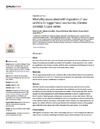Please use this identifier to cite or link to this item:
https://accedacris.ulpgc.es/jspui/handle/10553/57428
| Title: | Mortality associated with ingestion of sea urchins in loggerhead sea turtles (Caretta caretta): A case series | Authors: | Inurria, Alicia Arencibia Espinosa, Alberto Calabuig Miranda,Pascual Gómez, May Déniz Suárez, María Soraya Orós, Jorge |
Editors: | Ambrósio, Carlos E. | UNESCO Clasification: | 2401 Biología animal (zoología) | Keywords: | Canary-Islands Echinodermata Conservation |
Issue Date: | 2019 | Journal: | PLoS ONE | Abstract: | Aims: The aims of this study were: a) to describe the pathological and laboratory findings in a case series of stranding and mortality associated with ingestion of large amounts of sea urchins in loggerhead turtles (Caretta caretta), and b) to alert veterinarians and biologists involved in sea turtle conservation of this cause of stranding and/or death. Methods: The six loggerheads studied were stranded on the coasts of Gran Canaria, Canary Islands, Spain, between 2008 and 2015. Post mortem studies included pathological, microbiological, and sea urchin species identification procedures. Results: All turtles showed severe intestinal impaction caused by large amounts of sea urchins, mainly affecting the colon and the caudal half of the small intestine. Histologically, severe focal fibrinonecrotic enteritis was diagnosed in two turtles. In the remaining turtles, lesions ranged from mild desquamation of the intestinal epithelium to severe congestion of the blood vessels of lamina propria, submucosa, muscular and serosa, and edema. Vibrio sp. was isolated from the spleen and intestinal mucosa of a loggerhead in which focal fibrinonecrotic enteritis had been diagnosed. In five turtles, all the remains were fragments from longspined sea urchins (Diadema africanum); the last turtle contained a mixture of long-spined sea urchin (90%) and purple sea urchin (Sphaerechinus granularis) (10%) remains. Conclusions: Although the prevalence of this cause of stranding was low (< 1.6%) compared to other mortality causes, continued overfishing and anthropogenic climate change could increase its incidence. Intestinal impaction with large amounts of sea urchins should be included in the differential diagnosis of gastrointestinal diseases in sea turtles, and the possible toxic effect of some sea urchin species on sea turtles should also be investigated. | URI: | https://accedacris.ulpgc.es/handle/10553/57428 | ISSN: | 1932-6203 | DOI: | 10.1371/journal.pone.0221730 | Source: | PLoS ONE [ISSN 1932-6203],v. 14 (8), e0221730 |
| Appears in Collections: | Artículos |
SCOPUSTM
Citations
1
checked on Jun 8, 2025
WEB OF SCIENCETM
Citations
2
checked on Jan 25, 2026
Page view(s) 10
384
checked on Jan 15, 2026
Download(s)
237
checked on Jan 15, 2026
Google ScholarTM
Check
Altmetric
Share
Export metadata
Items in accedaCRIS are protected by copyright, with all rights reserved, unless otherwise indicated.
